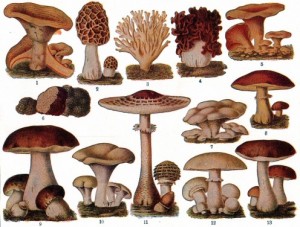Nutritional Value of Mushrooms
Contents
Mushrooms or fungus, come in different shapes and sizes and they are edible and enjoyed in many dishes. They contain nutrients and benefits that veggies also have, but they also contain nutrients that are found in animals, beans and grains. Mushrooms are a great source of B vitamins such as niacin, pantothenic acid and riboflavin which all provide the energy that your body needs. This is done by breaking down proteins, fats and carbs. B vitamins are also helpful for one’s nervous system. They are known as the “meat” of the vegetable universe.

Nutritional Composition of Mushrooms
The minerals found in mushrooms are the following: selenium, copper, potassium, phosphorous, small amounts of iron, zinc and manganese. Mushrooms also contain protein and dietary fiber, two essential components of a healthy diet. Mushrooms are low in saturated fat and sodium, and very low in cholesterol. You can also get your vitamin B, vitamin C and D from mushrooms.
Pantothenic acid
The acid helps with the production of hormones and also plays an significant role in the nervous system.
Riboflavin
This compund helps maintain healthy red blood cells. Niacin promotes healthy skin and makes sure the digestive and nervous systems function properly
Due to its high content of minerals , mushrooms bring iron and copper to your diet thus increasing the productions of red blood cells. These minerals boost bone mineral density and prevent conditions like osteoporosis and arthritis.
Potassium
A mineral many people do not get enough of. It helps in the maintenance of normal fluid and mineral balance and these help control blood pressure. It also plays a role in making the nerves and muscles, including the heart, function properly.
Beta-glucans
They are found in many mushroom species and have shown immunity-stimulating effects. They contribute to resistance against allergies and may also participate in physiological processes related to the metabolism of fats and sugars in the human body. The beta-glucans content found in oyster, shiitake and split gill mushrooms are considered to be the most effective.
Selenium
This mineral protects the hair, nails, and teeth, along with acting as a powerful antioxidant. Mushrooms as a whole are great antioxidants, which have been proven to protect against a variety of cancers, including breast cancer and prostate cancer. It also is important for the immune system and fertility in men. Many other foods of animal origin and grains are a great source of selenium, but mushrooms are among the richest sources of this mineral. This is important for vegetarians, whose sources of selenium are not as wide.
Vitamin D
When building your plate to maximize vitamin D, include mushrooms because they’re the only source of vitamin D in the produce aisle.
Mushrooms are ideal to include in any diet due to their low calories and fat-free properties. They are low in sodium but they provide a great array of nutrients found mostly in animal foods and grains. If you are looking to include gluten-free vegetables to your diet, mushrooms should be on the top of your list.



